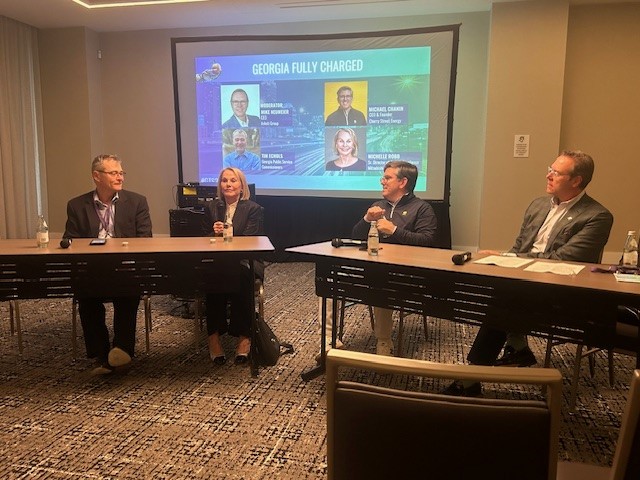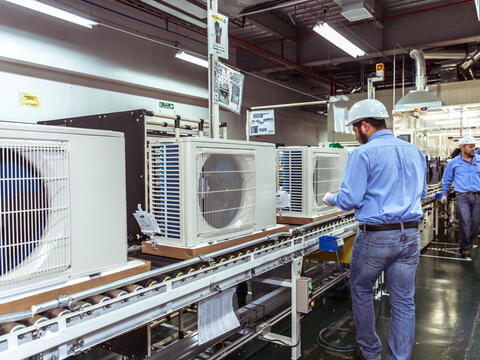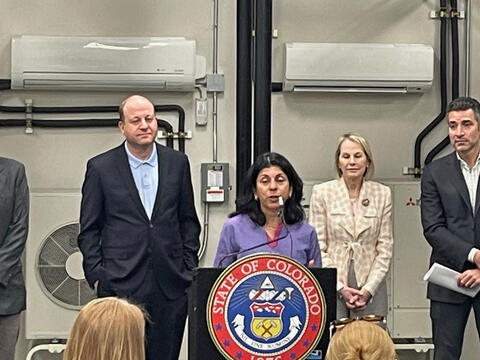METUS Executive Michelle Robb Shares Sustainability Benefits of Heat Pumps at Technology Association of Georgia’s 25th Annual Summit

From left, panelists of Georgia Fully Charged: A Hub for Electrification and Alternative Energy Innovation, are Tim Echols, commissioner of Georgia Public Service Commission; Michelle Robb, senior director of growth excellence at METUS; Michael Chanin, CEO and founder of Cherry Street Energy; and Mike Neumeier, APR and CEO of Arketi Group.
Electrification, sustainability and decarbonization are more than buzzwords. They are increasingly becoming a way of life.
During the Technology Association of Georgia’s (TAG’s) 25th Annual Summit, Michelle Robb, senior director of growth excellence at Mitsubishi Electric Trane HVAC (METUS), spoke during a learning session titled, Georgia Fully Charged: A Hub for Electrification and Alternative Energy Innovation.
Robb was joined by panelists Michael Chanin, CEO and founder of Cherry Street Energy, and Tim Echols, commissioner of the Georgia Public Service Commission. Mike Neumeier, APR and CEO of Arketi Group, moderated the panel.
METUS is headquartered in Georgia, which is home to a new wave of electrification and alternative energy companies establishing operations in the number-one state to do business. Specifically, METUS’s home office is in Suwanee, Ga., just north of Atlanta.
Georgia is a global hub for technology innovation and workforce development that includes the production of heat pumps, solar power systems, electric vehicles and batteries. The TAG electrification panel explored how their respective companies are leading the United States’ energy transition through their work in Georgia.
HVAC tech supports sustainability initiatives
Robb shared that METUS is a leader in HVAC technology, including ductless and variable refrigerant flow (VRF) systems. All-electric VRF technology is the fastest-growing segment of the commercial HVAC industry. METUS, as the manufacturer of all-electric, all-climate heat pumps, helps consumers and commercial businesses improve energy efficiency, performance and control to support their sustainability goals and reduce costs.
Considered critical clean technology, heat pump solutions produce between two and five times the amount of heat that they consume in electricity, possibly shaving dollars off a homeowner’s energy bills, particularly those reliant on inefficient, conventional fossil fuel-burning systems.
On the commercial side, businesses have sustainability goals they need to meet, whether self-imposed or government-mandated and can also potentially reduce annual operational costs via electrification.
“Our technology is an essential part of their toolkit to achieve those goals − driven by consumer demand for sustainable, environmentally friendly solutions that they’re also bringing into their own homes,” Robb said.
On the residential side, consumers want to be more sustainable. According to the METUS 2023 Heat Pumps & Homeowners Index, most respondents (82%) are concerned with their escalating energy bills, and it’s no wonder since:
- 46% said the cost to cool their homes rose last summer.
- 54% said their heating bills climbed last winter.
- 23% indicated their primary reason to consider a heat pump installation is to reduce these higher bills.
Buyers, whether consumers or businesses, no longer make tradeoffs to be sustainable.
The ecosystem of green-enabling technology is also much more established than in the past.
Robb reminded the audience that the Georgia ecosystem thrives on a healthy mix of collaboration and competition. The state has a powerful sense of community reflected in the way companies engage with each other.
Open to AI but not to replace HVAC pros
One of the biggest drivers of today’s news is AI. Just how will it affect the HVAC business?
AI won’t have the ability to install an HVAC unit, but it can help an HVAC technician install one and make the process more efficient, according to Robb.
As such, METUS is interested in virtual tools that can help contractors solve a problem quickly in the field without additional support. There’s also predictive modeling to determine what technicians will need to make installations and repairs more efficient.
METUS invests millions yearly to train contractors to install and service all-electric HVAC systems across 80-plus training centers nationwide. With the passage of the Inflation Reduction Act (IRA) – legislation that incentivizes residential and commercial electrification − METUS is redoubling its efforts to train a new generation of trade workers to install and service their heat pump systems.
Find out more about IRA incentives here.








